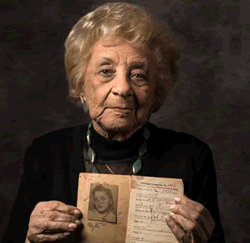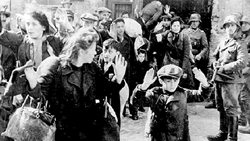Sydney woman Lena Golstein survived Holocaust by hiding in a bunker
January 26, 2016 5:00am
The Daily Telegraph

Lena Goldstein, 97, survived the Holocaust by hiding underground and writing a satirical newsletter by candlelight. Picture: Supplied by Sydney Jewish Museum
Sydney woman LENA GOLDSTEIN 97, survived the Holocaust by hiding in a Warsaw cellar. As the world marks International Holocaust Remembrance Day this is her story
I was born in Poland in 1919. When World War II started, Warsaw was the only city in the whole of Europe that defended itself for a month. But there were no deliveries of fresh food for that month, so as soon as the Germans occupied Warsaw they started a soup kitchen.
Everyone was sitting there in rows waiting with their bowls, including little boys, they knew one word of German — Jude, which means Jew. They were running around yelling “Jude, Jude, Jude”, excluding us from getting food. The Germans were telling us “Jews don’t have to eat.” This was the first sign of the German persecution.
The Nazis then put all of the Jews in Warsaw, along with others from towns and villages surrounding Warsaw, into one small area of the city. In 1940 they put 450,000 people into this area, surrounded by a big wall. We thought it was good that we would have no direct contact with Germans, but we did not expect what was coming.
First of all our ration of food was so small.People bartered possessions for food until they were reduced to begging. Over time some became living skeletons and then corpses. Families had no money for funerals so they would leave them there and just cover them with newspapers. At first it was shocking but eventually people stopped taking notice.
The biggest heroes of the ghetto were small boys who found ways to smuggle in food. If they were caught by a sadistic guard they could be killed for having even a small crust of bread.
People were packed so tightly into the ghetto that typhus, carried by body lice, spread quickly killing hundreds.
In 1942 the Germans began their Aktions (mass deportations). They promised jobs for workers in factories in the east. Many took up the offer, but a few escapees returned to reveal the truth. Packed into trains like cattle, the “workers” were transported to Treblinka, told to strip and then sent into showers — except the showers were not water, they were poison gas. First women and children and then the men. Thousands per day were killed. It seems unbelievable now and it was unbelievable then.
My parents had a job washing German uniforms in Warsaw. But I wasn’t allowed to work, so I was hiding beneath the bloodied uniforms when my mother was called out (on a Jewish Holiday) during another Aktion and sent to a death camp.
I then took her place washing uniforms.
My father divided his food ration — watery soup and a small bit of bread — between himself, me and another old gentleman who had also been hiding and was now on his own.
On Jewish Atonement Day, the Germans came for more deportees. I tried to go with my father but I was whipped and dragged back to the laundry.
German troops leading Jewish civilians from their Warsaw ghetto to their execution during World War II.
The Wannsee Conference in 1942 had decided on the final solution for the Jews leading to desperation. My boyfriend was killed in the Warsaw Ghetto Uprising of April 1943.
I then thought “If I am going to die tomorrow, I am not washing uniforms today.” I tried to provoke the Germans into killing me but instead two guards offered to help me escape. I refused because I didn’t want to leave my brother, but I was touched by their willingness to risk their own lives.
The old gentleman’s family, knowing what my father had done for him, slipped me a note offering me a hiding place. I showed my brother and he told me “we all have to try to survive in some way. Somebody has to be left alive to tell the world what is happening here because nobody would believe it.”
The two German guards were at the main gate and they just let me get out of the ghetto, taking only a handbag with photos of my family. I joined three others hiding in a caretaker’s locked bathroom in a mansion.
By 1944, the Germans were losing the war and were starting to abandon Warsaw, but they returned when the Poles staged an uprising. We had to find a new hiding place.
A man dressed like a Polish peasant offered us a bunker below a pharmacy. For six months we hid there unable to wash or change clothes. To keep up morale, I wrote a satirical magazine The Bunker Weekly. We stayed there until Poland was liberated.
All this time, when I lost my parents, my brothers, my extended family, my boyfriend, everybody I ever knew, I didn’t cry because we were waiting for our turn.
But when I heard that I was free, I sat there and I cried, because in the whole world I had no one waiting for me and no one to go out to.
As told to Troy Lennon
